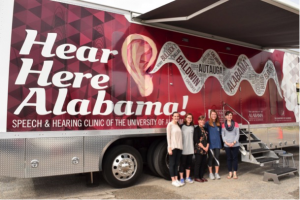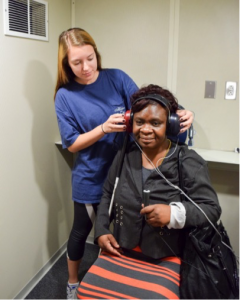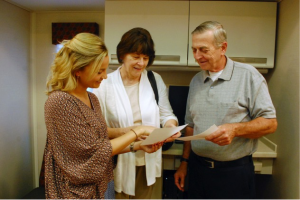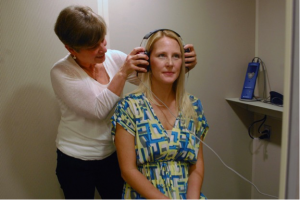University of Alabama students take a hearing clinic on the road to rural Alabama counties.
By Cara Walker

When Dr. Marcia Hay-McCutcheon came to The University of Alabama from Indiana in 2008 as an associate professor in communicative disorders, she tried to continue studying cochlear implants. But she soon discovered the number of people in Alabama with cochlear implants was not sufficient for research, and many communities lacked resources for basic hearing health care. In order to remedy this problem, she launched Hear Here Alabama to take needed resources to the people of rural Alabama.
The project’s mission is to diagnose hearing loss and provide treatment services using a mobile clinic equipped with all the necessary tools – and completely free of charge for those it serves. It’s aimed particularly at residents who can’t easily travel. After completing a two-year pilot study with the help of students and numerous UA campus partners, Hay-McCutcheon and 13 students, many of whom earned academic credit through the CD 350 independent study, received the go-ahead in October 2015 to begin taking a mobile hearing center to rural West Alabama counties including Marengo, Dallas and Wilcox.
“A large percentage of Alabamians are estimated to have an undiagnosed hearing loss and/or no resources to address the hearing loss,” Hay-McCutcheon said.
Approximately 22 percent of the population is 55 years old or older, she notes, and Alabama is the nation’s seventh poorest state, according to the 2014 Alabama Poverty Data Sheet.
Along with service, research is a component of the project. Hay-McCutcheon said the team hopes to discover the extent of hearing loss among the West Alabama population. Through the pilot study, she and students also began exploring the link between hearing loss and emotional and physical well-being by conducting surveys along with hearing tests. The surveys ask questions regarding social support and general and emotional health.

“The idea is not only to provide hearing health care to people who don’t necessarily have it, but also to explore more in terms of how hearing affects other aspects of living,” Hay-McCutcheon said.
The preliminary findings of the pilot study, which included 300 participants in Tuscaloosa, Pickens, Greene, Bibb and Fayette counties, showed that not only is hearing loss highly associated with physical well-being, but for people older than 65, hearing loss is significantly associated with social functioning.
Katerina Puzinauskas, a graduate student studying speech language pathology, said the goal of Hear Here Alabama is to improve quality of life. “If your hearing is affected, it affects all other areas of your life,” she said. “People with an untreated loss can become withdrawn or depressed and can have a truly hard time functioning in their day-to-day lives.”
Since 2013, 39 UA students have been involved in Hear Here Alabama projects. Students have administered hearing screenings, surveys and visual memory tests and are solely responsible for entering information into the project’s database. They also presented findings from the pilot study at the American Speech Language Hearing Association’s 2014 annual meeting in Orlando, FL.
Rachel Naugher, a graduate student in speech language pathology who began working on the project during her junior year, said she didn’t expect to find so many undiagnosed hearing problems. “Some people are surprised, while others may have known all along but never confirmed their suspicions,” said Naugher, who assisted with hearing tests. “There is a serious need to educate people about hearing loss and the ways that it can be prevented and treated. There are means out there to assist with these issues. We just need to get the word out.”
The mobile-clinic team is comprised of students in the CD 350 course and volunteers who are also studying communicative disorders.

The team worked closely with the College of Arts and Sciences, the Office of Academic Affairs, the Office of Research and the Center for Economic Development to procure funds for the clinic. County health departments and the Alabama Regional Tombigbee Commission helped the team coordinate and spread word of its services in various communities. The mobile unit is typically set up at health departments and senior centers.
Puzinauskas said the project is a great way to serve the community while gaining real-world experience using skills acquired in class. “Working under Dr. Hay-McCutcheon on this project was such an amazing experience,” she said. “Not only did we get to assist with research and hearing screenings, we also got to see the direct effects of providing beneficial medical assistance to those who can’t access it. It was so rewarding, and these experiences are so applicable to my career after graduation.”
Amanda Jones, a senior majoring in communicative disorders, said she realized through the project why hearing loss can have a sweeping, negative effect on a person’s life. “We are social beings,” she said. “If you have a hearing loss, you can’t function well in social settings and you kind of feel isolated and you tend to isolate yourself.”

As the mobile clinic continues to collect data, Hay-McCutcheon said the goal is to provide hearing aids at no cost to those who are diagnosed with hearing loss. Her team will evaluate them to see if the hearing aids have an impact on their physical and emotional well-being.
The team refers residents who have medical conditions associated with their hearing loss to the closest specialist, Hay-McCutcheon said. Since many counties don’t have a specialist and some participants aren’t able to travel, she is building relationships with physicians and nurse practitioners who she hopes will begin traveling with the mobile clinic.
Jones, who is from Northport, Ala., said she appreciates taking part in the foundation of an important project. “I love being able to say that I helped in blazing a trail, especially something big like this where I’m from,” she said.
This story was originally published by the Center for Ethics and Social Responsibility. For more information about Hear Here Alabama, contact Dr. Hay-McCutcheon at 205-348-4572 or marcia.hay-mccutcheon@ua.edu.